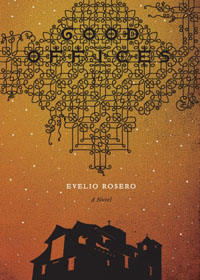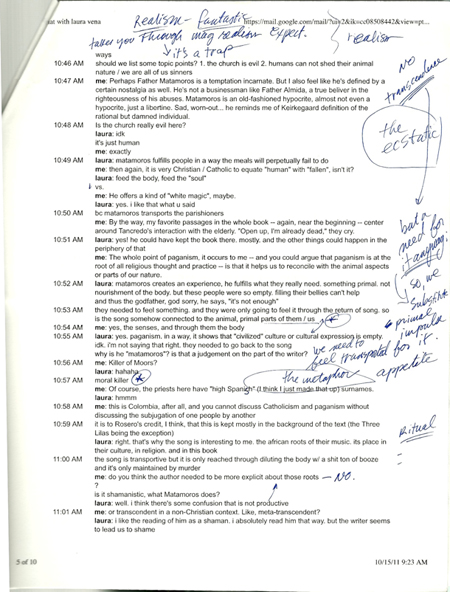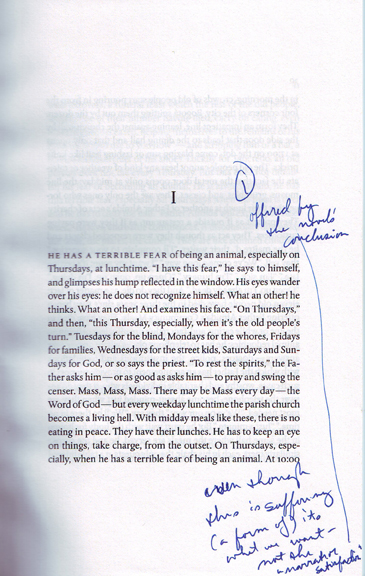 Good Offices
Good Offices
by Evelio Rosero
Trans. by Anne McLean & Anna Milsom
New Directions, 2011
144 pages / $13.95 Buy from New Directions or Amazon
In September of 2011, my colleague Laura Vena and I decided that we were both sufficiently interested in Evelio Rosero’s Good Offices to attempt a “collaborative review” of the novel. (As something of a student of the novel-as-form, I was intrigued by Good Offices‘ superficial resemblance to Lewis’ atypical Gothic The Monk. Laura, though she will probably raise a protest, is an expert in Latin American literature.) Laura and I ultimately agreed that our collaboration would take the form of a conversation about the book, which we each read yet refrained from discussing prior to our officially meeting. Presented here is as full, complete and accurate a record of our conversation as Google’s transcription of our live chat will allow. What it lacks in context and gracefulness I trust it makes up for in spiritedness and candor. In fact, reading over these exchanges again, I appreciate how they allow me to eavesdrop on those selves taking turns speaking up—can I really say that they speak through me?—when I talk about books. Or: when I am retelling yet again those fictions by virtue of which we can even discuss the notion of fiction. (JM)
A word about tone: due to the candid nature of IM conversations, much of the following text is raw in character. My initial impulse was to edit out all my informal language, which reflects not my intellectual self, but the manner in which I engage in impassioned conversation with friends… Not necessarily for mass consumption. But in discussions with Joe, we ultimately felt we should maintain the tone of the original conversation to keep true to the experiment of long-distance collaboration that resulted in this review. For better or worse. (LV)
***
JM: yeah, so, I’m curious… what is your overall impression of this book?
LV: in what respect: as in do i think it’s a strong work or what kind of work is it? what’s it doing that’s interesting to us? what’s it failing at? what’s it failing at well and at what poorly?
JM: any of the above, really. I have to say I exited this book with a feeling of vague disappointment, vague as in both “ill-defined” and “of indeterminate origin.”
LV: to me it failed at this: some of the more interesting aspects that were begun early on dropped off. gone. vanished.
JM: yes, the opening paragraphs are very strong. “He has a terrible fear of being an animal…” Not, “feeling like a animal”, no shelter offered by similes or analogies here. But the brute fact: he (it turns out “he” is the hunchback / glorified altar boy Tancredo), like all human beings, is an animal, or of animal nature.
The irony being: fear is a very animal emotion, here recast at the utmost in rationality.
LV: for me, it starts like a modern fairy tale almost. beauty and the beast. except the beast is overcome (poisoned by / captive to) his humanity, and the object of his lust (or the director of it) is a seemingly madonna-esque (as in the virgin, not the one like a virgin) the sinner, she’s the beast
i’m very disappointed in the stereotypical latino portrayal of women here: the spoiled virgin, the old witches, all the old fucking tropes in which women are caricatures.
i like what you say, though, about the animal parts of us, or really, to be human is to be animal
JM: Sabina is a potentially fascinating character who ultimately only sings one note. There’s something both spectral and carnal about her, but not in an overtly Gothic way (she’s not a revenant, or a succubus), but Rosero does little to develop her relationship with her own sexual urges
LV: yes, yes. beautiful
and of course, he throws in that her godfather raped her
so, she’s a victim of sexuality, not a master of it
those first paragraphs are the best in the book
JM: true, but that kind of psychological “backstorying” always feels cheap and soap opera-ish to me
LV: yes. that’s what i mean—cheap and disappointing and fucking typical. it’s like the female equivalent of a fictive castration
JM: I agree… and I think those first paragraphs contribute far more than any of explicitly / intentionally satirical portions of the novel to articulating an original point-of-view on organized religion. But I was not as aware or bothered by the apparent stereotypes, in part, because this is a fantastical grotesquerie
LV: that’s a really great categorization for this, and defining it that way almost makes it better… except that it still disappoints.
i found the characterization of women terribly annoying
of course, we see more in the minds of the men
not just tancredo
JM: it is a man’s world, which may be part of the critique rosero is leveling at this world
LV: men are “of the brain” even if they’re worrying about becoming animals. even the cantor, singing priest, so of the body / bottle, seems to channel some mystic brilliance, seems to deliver. but of course, that character to me seems to embody temptation. maybe i can’t have that both ways

JM: Perhaps Father Matamoros is a temptation incarnate. But I also feel like he’s defined by a certain nostalgia as well. He’s not a businessman like Father Almida, a true believer in the righteousness of his abuses. Matamoros is an old-fashioned hypocrite, almost not even a hypocrite, just a libertine. Sad, worn-out… he reminds me of Keirkegaard’s definition of the rational but damned individual.
Is the church really evil here?
LV: idk
it’s just human. no transcendence is really possible, but there’s a need for it anyway. so, we substitute a primal impulse. we need to feel transported.
JM: exactly
LV: matamoros fulfills people in a way the meals (provided by the church to the hungry) will perpetually fail to do
JM: then again, it is very Christian / Catholic to equate “human” with “fallen”, isn’t it?
Matamoros offers a kind of “white magic”, maybe.
LV: yes. i like that—what u said
bc matamoros transports the parishioners
JM: By the way, my favorite passages in the whole book — again, near the beginning — center around Tancredo’s interaction with the elderly at those meals he dreads. “Open up, I’m already dead,” they cry.
LV: yes! he could have kept the book there. mostly. and the other things could happen in the periphery of that
JM: The whole point of paganism, it occurs to me — and you could argue that paganism is at the root of all religious thought and practice — is that it helps us to reconcile with the animal aspects or parts of our nature.
LV: matamoros creates an experience, he fulfills what they really need. something primal. not nourishment of the body. but these people were so empty. filling their bellies can’t help
and thus the godfather, god sorry, he says, “it’s not enough”
they needed to feel something. and they were only going to feel it through the return of song. so is the song somehow connected to the animal, primal parts of them / us
JM: yes, the senses, and through them the body
LV: yes. paganism. in a way, it shows that “civilized” culture or cultural expression is empty. idk. i’m not saying that right. they needed to go back to the song
why is he “matamoros”? is that a judgement on the part of the writer?
JM: Killer of Moors?
LV: hahaha
“moral killer”
JM: Of course, the priests here have “high Spanish” (I think I just made that up) surnames.
LV: hmmm
JM: this is Colombia, after all, and you cannot discuss Catholicism and paganism without discussing the subjugation of one people by another
it is to Rosero’s credit, I think, that this is kept mostly in the background of the text (the Three Lilas being the exception)
LV: right. that’s why the song is interesting to me. the african roots of their music. its place in their culture, in religion. and in this book
the song is transportive but it is only reached through diluting the body w/ a shit-ton of booze and it’s only maintained by murder
JM: do you think the author needed to be more explicit about those roots?
LV: no. well. i think there’s some confusion that is not productive
JM: is it shamanistic, what Matamoros does? or transcendent in a non-Christian context. Like, meta-transcendent?
LV: i like the reading of him as a shaman. i absolutely read him that way. but the writer seems to lead us to shame
i don’t know that we needed to see the other priest dead, etc.
JM: do you think GOOD OFFICES is a case of a book that goes too far into allegory?
LV: yes
well put
do you?
it’s overwrought w/ it
JM: you know i have strong reservations about allegory
and I feel its presence here, though not always

LV: and what worked in the beginning as i look at it is its animal-ness
JM: or consistently
LV: i mean, it’s so obsessed with the moment
and then it moves away from the experience of the moment into some kind of moral hell
JM: yes, but I think it also has a strong critique to offer to anyone who would romanticize “native life before the Spaniards”
LV: the beginning i mean is obsessed w/ the moment
possibly. not overtly though
JM: its urgent in the best way, that opening
LV: yes, “especially on thursdays at lunchtime”
JM: I don’t know… there is something truly awful about the Llilias opting for revenge
LV: yes. i agree w/ you. it turns them into caricatures
i think it does. work against it an a most specific way
JM: i think that, as a reader, i most object to allegory not because it is didactic, but because it requires me to betray my attention to the text, if that makes any sense
LV: god it’s a revelation to me. maybe this is part of why you dislike allegory. it tries so hard to not be in the moment
anyway
i think this text is split.
divided into 2 parts
JM: how so? where does it bifurcate? and shouldn’t we expect some sort of tripartite breakage here? or am I being corny?
JM: yeah, but I don’t want conventionally “realist” texts either
LV: no. of course
JM: yes, the text, like the New World itself (thanks, Cortazar!) is this very fraught combination (I want a stronger word, though) of distinct cultures
LV: convergence? collision (my fav)
JM: but — back to allegory for a second — I think of Bunuel, and how he can, in a film like The Discreet Charm of the Bourgeoisie, suggest “deeper meaning” through very specific and concrete images, actions. Not just allusive names and exposition.
LV: you know what? is it partly disappointing bc no one seems to be steady here. i mean i don’t know who the fuck any of these people are. i think tancredo is the closest to a non-sketch of a character, but he seems to fade. they all fade. only the lilia’s actions and power persist. and they are not individuals. they are a coven (a group of 12 / 13 with friends; i forget)
i wrote that as you wrote yours and i think they can be related. who’s concrete here
JM: and all this could work if the text were a bit more self-conscious of itself
LV: yes
the animal in “us” gets fed by, superseded by, etc. the metaphysical
i mean how the fuck is that working
i’m confused
JM: oh, the terror of metaphysics
LV: haha. but i don’t think there’s really a difference between the animal and the metaphysical…?
JM: how so?
LV: if we are talking metaphysical in terms of supernatural, in the world of this book, “magic” or mystic things happen only to satisfy our animal natures. I think the book in a way subverts the seeming contradiction of the terms. The metaphysical is driven by something beastly.
JM: metaphysics are especially terrible / awful / predatory (maybe?) when mixed-up with morality / moralism
I wish Tancredo were a bit more cognizant of the various narratives which he is, at times, helplessly enacting (and you get a bit of that in his interactions with the Church’s Blessed Telephone), or if Matamoros were a bit more sinister
or, better yet, if everyone in the book were complete ciphers
LV: the power of the lilias is the slave of their fucking need to satisfy their cavernous hunger (they lost everything; the govt killed their families, they lost their homes) and their act of rebellion is fuelled by their righteous indignation ( their “saviors” worked them to the bone; they were enslaved). and so they kill them. just another representation of the truth that saves. this is the allegory: to express power in a misogynistic society, women have to become “evil.”
yes to your point—Tancredo’s not solid enough somehow. starts off so well
JM: But Catholicism never promises anything but suffering on the way to salvation
LV: there is political commentary in the lilias and their reversal
JM: Pick up your cross, Laura
LV: haha
damn. he really packed too much in a little text
the history of race, domination, and genocide in columbia
JM: Yes, I don’t know how much of an issue Rosero takes with Catholic doctrine per se as opposed to “The Church” (never that monolithic, of course)
LV: you know what? that’s a good point
i still feel that he was somehow portraying all that transpired as “sin”
JM: I can’t read this book except through my own experience growing up Catholic, and in a very conservative, pre-Reformed-feeling church
Well, the ending is anything but happy
LV: yes. but the lillias are happy
JM: Matamoros being carried away as a sort of sacrificial figure
LV: haha
he is going to become their slave
JM: how so?
LV: i can’t imagine that they aren’t going to keep him alive. the lilias are now presiding. Matamoros has no authority.
JM: i suppose. just because a figure is sacred, that does not invest it with any power. it just removes that figure from the regualr flow of power. you do get that sense, though, right, that Matamoros is in danger?
LV: it reminds me of a roman polanski film
yes
JM: more blood is going to be spilled
LV: they even fatten him up like hansel and gretel
JM: and no ideas, however beautiful, ever excuse that
LV: right.
JM: So… Is GOOD OFFICES an allegory? It is part of a “magical realist” tradition in which allegory, and the breakdown of allegory, is a critical concern? I hate that all Latin American lit has to be read through the lens of magical realism
LV: yes. the language is so NOT magical realism. in fact, i half thought it was a failure bc it tried to hard to be anti-m.r.
me too. but if the shoe is meant to not fit…
JM: if this novel is a critique, is Rosero’s issue with specific aspects of Catholic doctrine per se or with “the Church” as an institution?
LV: or maybe broader: what is the novel’s critique of catholicism and / or the catholic church.
JM: Or perhaps, is this an amoral text? Is this a text in favor of a return to paganism?
LV: what the hell is his critique of the church, or is it of catholics, society, those who go to church? i think he is judging and condemning humanity in a way.
LV: you know what else? i can’t help but feel that the translation creates some of the problems
you can add drama where it’s not; derail so much
JM: yes. how language is used in the original is, for me, the key to determining how “self-conscious” a text this is
LV: (from an article about the writer, http://bombsite.com/issues/110/articles/3364) “He seems to have tamed the monsters, to have confined them to those books of his infested with solitary, misunderstood beings, who are often also desperate, ill, insane, or senile. All of them are Colombian heroes undertaking, almost always, fruitless pursuits with no point of return.”
i wish tancredo would have done the killing.
JM: that’s the last line of the review, right there
***
Joe Milazzo is co-founder of the interdisciplinary arts organization Strophe, co-editor of the online journal [out of nothing] and proprietor of Imipolex Press. His writings have appeared in Antennae, Drunken Boat, Everyday Genius, H_NGM_N, Super Arrow, The Collagist, Black Clock, and elsewhere.
Laura Vena is a writer, artist, curator and translator whose work has appeared in Tarpaulin Sky, In Posse Review, Antennae, and the forthcoming anthology Dirty : Dirty (Jaded Ibis). Laura teaches Latin American Literature and writing and holds an MFA in Creative Writing and Critical Studies from CalArts.
Tags: Evelio Rosero, Good Offices, joe milazzo, Laura Vena

Smart review, smart reviewers. Wish I knew more of the novel’s frame/setup or of Rosero’s general practice (because I’m ignorant and under-read) but that’s just one mouse-click away, on the other hand.